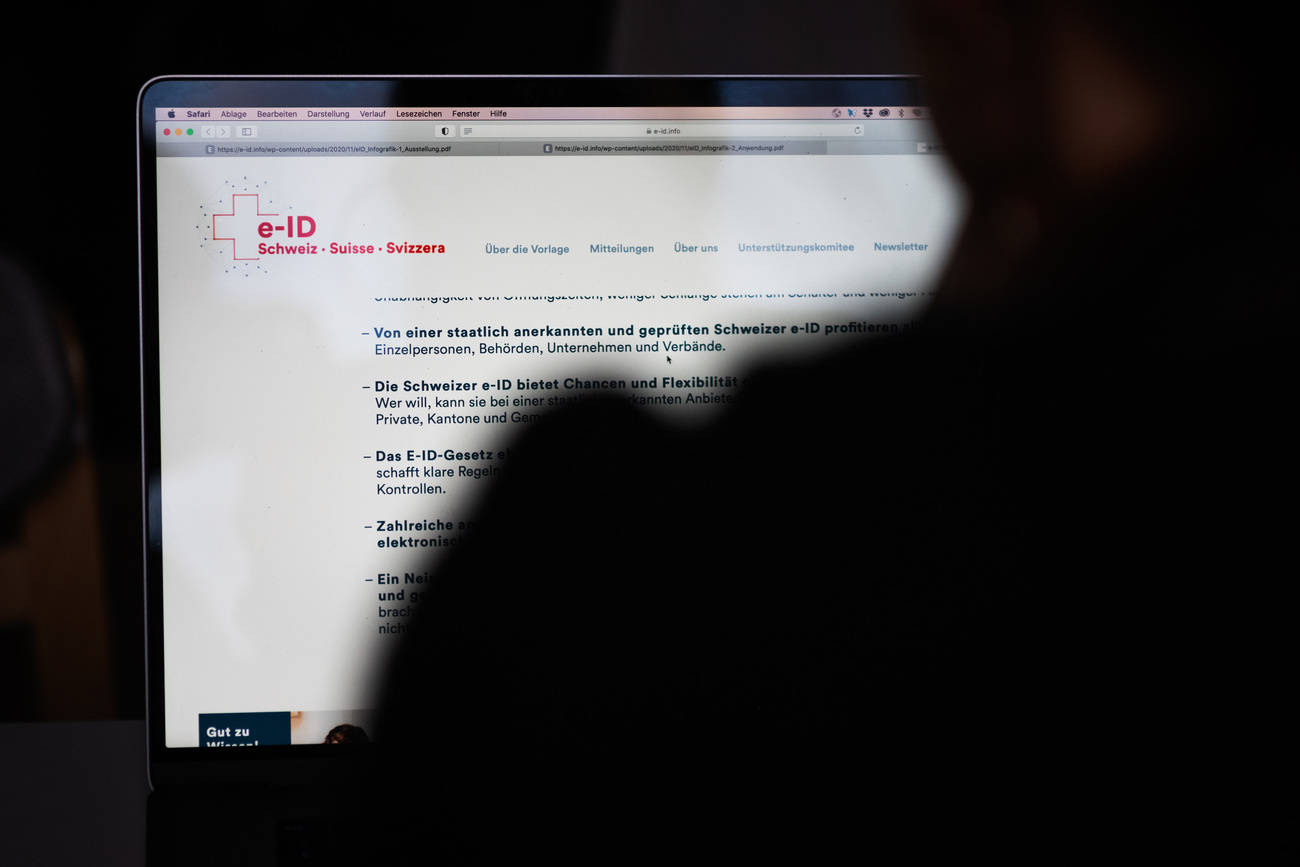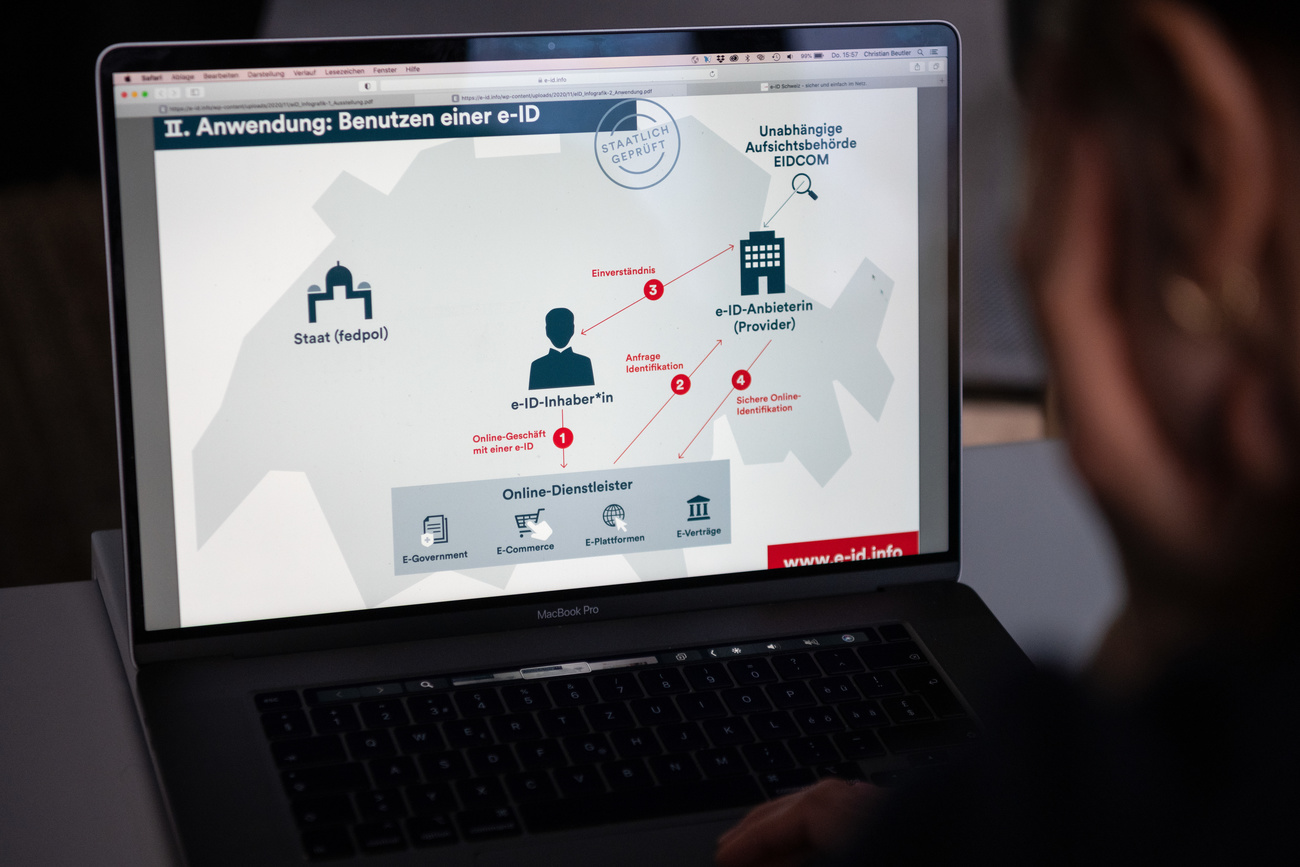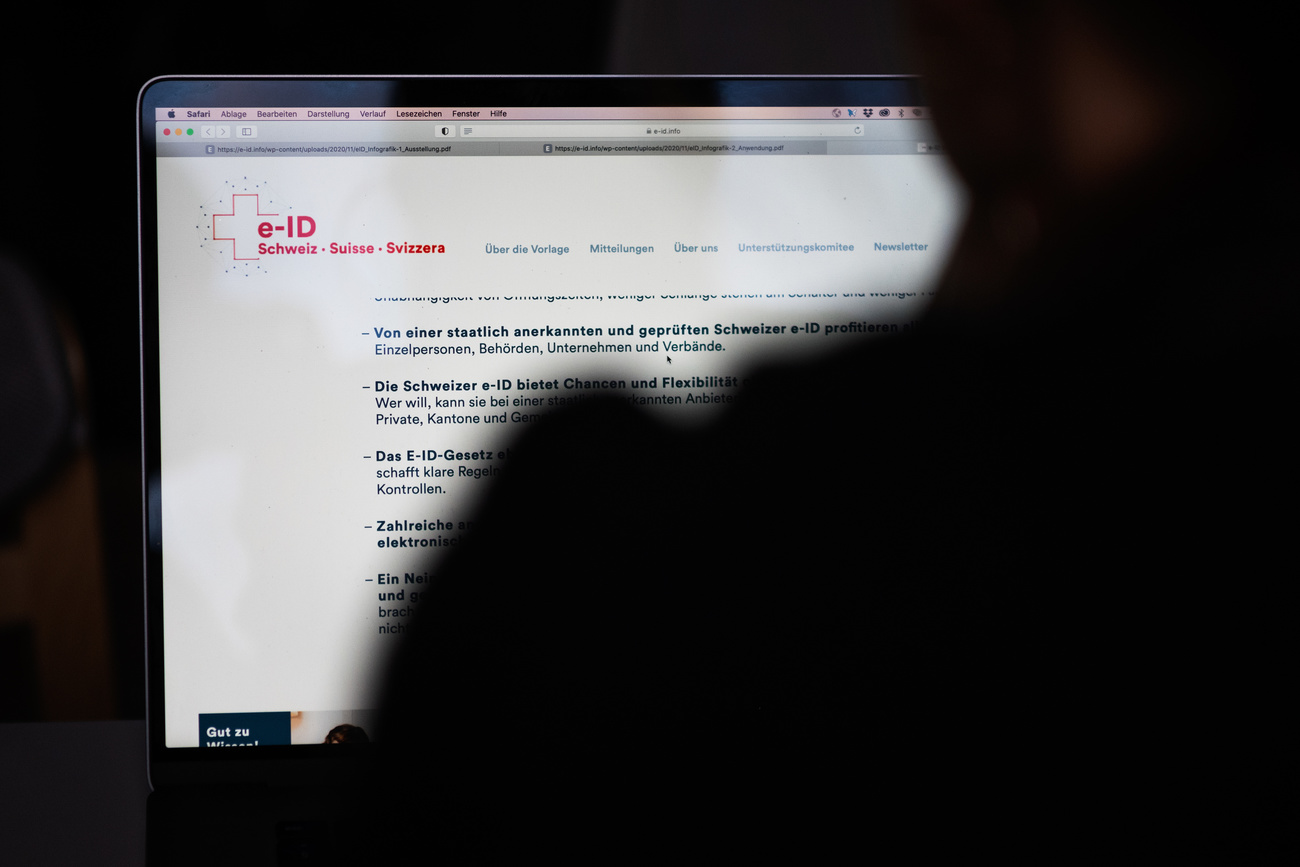‘Electronic identity will make life easier for Swiss Abroad’

The Swiss government wants to introduce a free, voluntary digital identity document. This will offer improved security and make it easier for Swiss citizens living abroad to exercise their political rights, say two guests on SWI swissinfo.ch’s Let’s Talk debate webcast.
“The federal government has made a considerable effort to put forward an electronic identity [e-ID] project that ensures better data protection,” says Lennig Pedron, the executive director of Trust Valley, a public-private partnership for digital trust and cybersecurity based in the Lake Geneva region.
In March 2021, Swiss voters rejected an initial e-ID scheme at the ballot box, mainly because of concerns over the centralisation of data and the involvement of private companies. Last November, the government approved the outlines of a new plan, this time entirely state-run.
Pedron welcomes the efforts of the government to respond to the criticisms levelled two years ago. “The data will remain in the user’s possession,” she says. People will also be able to choose what information to provide. Thus, to be able to buy alcohol online, for example, they can indicate that they are over 18, without revealing their exact date of birth.
Swiss Abroad in favour
The Organisation of the Swiss Abroad (OSA) supports the proposed plan. “An electronic identity would make life easier for the Swiss Abroad,” says Ariane Rustichelli, the body’s director.
A digital document would simplify access for expatriates to federal government services, she explains. She also hopes that Swiss citizens abroad will gain improved access to Swiss banking services as a result.

More
Swiss Abroad give a clear ‘yes’ to a digital ID
“An e-ID should also make it easier for them to exercise their political rights,” Rustichelli stresses. Secure identification on the internet will make fully digital e-voting procedures possible. This is a key issue for the OSA, which has been fighting for this for years.
“Swiss citizens living overseas or outside major urban centres are often unable to take part in votes or elections because the relevant materials do not arrive on time,” says the OSA director.
Switzerland lagging
Christoph Haelg, a Swiss expatriate working in finance in Luxembourg, has already experienced the benefits of having a digital identity in his host country. He would be happy if Switzerland implemented such a solution. “For administrative requests to the authorities, I sometimes have to go in person to the consulate or even travel to Switzerland,” he explains. “With an e-identity, I could do all this online.”
Nearly all European countries now offer digital identity solutions. The Swiss political system – with its direct democracy – partly explains why the country is lagging behind in this field, according to the digital trust expert Pedron. Given the security issues involved, however, she believes it is wise to proceed cautiously.
Progress towards e-voting
Alongside the issue of e-ID, the introduction of e-voting has also floundered. Authorities have been trying to set up a system for 20 years but have encountered several setbacks.
In 2018, the canton of Geneva withdrew its scheme for financial reasons, and in 2019 Swiss Post did the same with its set-up after flaws were discovered. After that, no more mechanisms were available. “It was a big disappointment for the Swiss Abroad, but also for our organisation. We were very disheartened,” says Rustichelli of the OSA.
Meanwhile, Swiss Post quickly developed a new system, which is now being tested in three cantons (Basel City, Thurgau and Graubünden). Canton Geneva also intends to start trials again, according to the OSA director. “Things are now moving in the right direction. The Federal Chancellery [which plans and coordinates government business] and Swiss Post have understood that they need to work with academics and independent hackers to build trust,” she says.

More
Digital identity scheme shot down by voters over data privacy concerns
Costly technology
Rustichelli believes there is now a political consensus on the importance of e-voting for the Swiss Abroad, as for other target groups. “The biggest obstacle to the introduction of e-voting in Switzerland today is funding,” she observes, as the federal government and the cantons are in a period of budgetary recession.
From a security standpoint, Pedron of Trust Valley stresses the importance of setting up a system that can be constantly challenged and improved. “I think we are very lucky in Switzerland to be able to carry out trials, as was done in June and October with e-voting at Swiss Post,” she notes.
“There is still a great deal of mistrust towards digital tools today,” she adds. More needs to be done to educate and inform people in order to boost confidence. “There is still a lot of work ahead. It’s going to be a long road, but we have to take the time to travel it.”
Eroded trust
The Swiss government has been hit by several cyberattacks in recent months, resulting in the publication of sensitive data on the darknet. Last May, 425,000 addresses of Swiss Abroad who subscribe to the magazine Swiss Review were stolen and published. The hackers obtained the addresses by attacking the digital ecosystem of CH Media, which prints the magazine.
Sometimes, the aim of the hackers is purely to fuel public mistrust. “Some attacks are aimed at making money, while others seek to undermine confidence in systems, in the state,” explains Pedron.
The risks have to be taken seriously, the expert cautions. “I’m not sure that any country in the world is fully equipped to fight cybercrime,” she says. “We are up against highly organised crime with big money at stake.” In a move welcomed by Pedron, the Swiss authorities have created a Federal Office for Cybersecurity, operational since January 1.
Translated from French by Julia Bassam/gw

In compliance with the JTI standards
More: SWI swissinfo.ch certified by the Journalism Trust Initiative










You can find an overview of ongoing debates with our journalists here . Please join us!
If you want to start a conversation about a topic raised in this article or want to report factual errors, email us at english@swissinfo.ch.